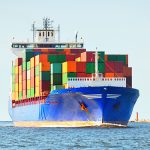Mitsui O.S.K. Lines, Ltd. announced that it signed a deal for financing, through a transition linked loan, relying on a transition finance framework and the Sustainability-Linked Loan Principles, from Sumitomo Mitsui Banking Corporation (President and Chief Executive Officer: Makoto Takashima; Head Office: Chiyoda-ku, Tokyo) to fund the construction of the SHOFU MARU, the world’s first bulk carrier equipped with the Wind Challenger hard sail wind power propulsion system. MOL and Oshima Shipbuilding Co., Ltd. (President: Eiichi Hiraga; Headquarters: Saikai-shi, Nagasaki Prefecture) collaborated to lead the development of the system under the Wind Challenger project.
The loan is a financial methodology designed to support companies that are considering measures to address climate change and taking initiatives to reduce greenhouse gas (GHG) emissions in line with a long-term strategy to achieve a decarbonized society. This is the second transition loan financing for MOL, following one that funded the construction of the LNG bunkering vessel Gas Vitality.
MOL has established a Transition Finance Framework, which sets the targets in the “MOL Group Environmental Vision 2.1,” as sustainability performance targets, and obtained third-party evaluation from DNV Business Assurance Japan for compliance with all of the following criteria.
The bulk carrier SHOFU MARU was built at Oshima Shipbuilding and delivered today, October 7, and will serve Tohoku Electric Power Co., Inc. (President: Kojiro Higuchi; Headquarters: Sendai-shi, Miyagi Prefecture). Installation of one Wind Challenger on the vessel is expected to reduce GHG emissions by about 5%-8% compared to a conventional vessel of the same type, contributing to a reduction in environmental impact and improved economic efficiency. In addition to SHOFU MARU, MOL Group has already decided to construct a second bulk carrier equipped with the Wind Challenger.
MOL Group set a target to achieve net zero emissions by 2050. The group continues to further promote measures to reduce the environmental impact, including the use of energy-saving technologies, which take advantage of wind, such as this project, and contribute to realization of a low-carbon society.
MOL Group will contribute to realizing a sustainable society by promoting responses to sustainability issues, which are identified as social issues that must be addressed as priorities through its business.
We anticipate this initiative to contribute especially to the realization of “Environment-Conservation of the marine and global environment-” and “Innovation-Innovation for development in marine technology.”
Source: Hellenic Shipping News





